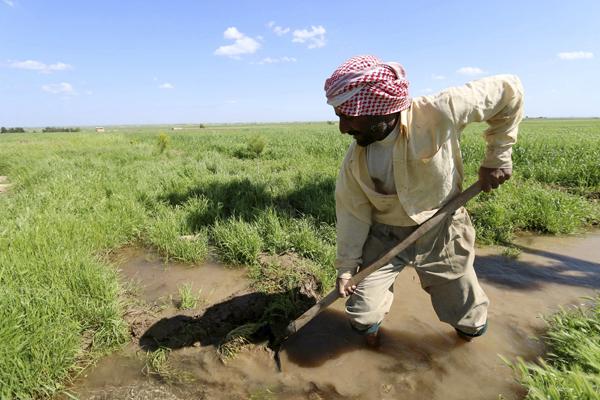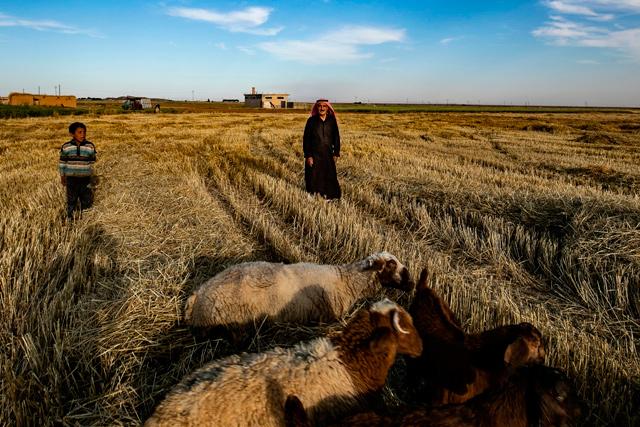You are here
Syria sees money in bumper harvest, but getting to it is hard
By Reuters - May 20,2015 - Last updated at May 20,2015
AMMAN — Syria's hopes of cutting its import bill thanks to an expected healthy harvest may be thwarted by the problems of getting hold of the wheat while the war rages.
The government is keen to purchase grain from farmers in rebel-held areas to prove its control and ensure ample supply of bread for citizens under its rule, although many, fearful of getting payment from the state, have turned to crops like lentils.
Officials and experts say the main challenge, as the harvest begins in earnest in the next two weeks, is how much it can entice farmers to sell to the state, combined with the ability to safely move the crop to collection centres in government held areas.
More than half of Syria's wheat production areas in both the north and the south have fallen under rebel control.
"We want to buy the whole production of this season," said Musa Nawaf Al Ali, the head of the state grains marketing organisation that buys the crop from farmers, adding the authorities had opened new collection centres and offered more incentives.
The lure of a once lavish subsidy system has been hurt as the war forces some farmers to sell their crop cheaply to middlemen and merchants who smuggle it to neighbouring Iraq and Turkey.
In the rich arable northeastern Hasaka province, where at least 40 per cent of Syria's pre-war wheat production of around 4 million tonnes was grown, there has already been a shift away from wheat and cereals.
"The farmer who was more and more afraid the state may collapse, year after year of conflict, planted more lentils, cumin, coriander and fenugreek," said Kurdish farmer Rudi Sheiko from Qamishli.
Large fields that once were sown with wheat are now planted by these cheaper crops that have a shorter harvesting span and bring better profits.
Food handouts
The government's drive to reduce expensive food imports comes after the collapse of its ability to feed its people.
"Now 50 per cent of people inside Syria are food insecure, meaning they need food assistance for their daily needs," said Abdessalam Ould Ahmed, of the United Nations Food and Agriculture Organisation (FAO), who is responsible for the region. "Before the crisis it was less than five per cent."
"Imports will increase simply because the needs are increasing and production has collapsed and it is now only 25 or 30 per cent of what it used to be 25 years ago. So therefore there is a need for imports," Ould Ahmed added.
The state announced earlier this month a rise in the price of a kilogramme of wheat it bought from farmers to 61 Syrian pounds (25 cents) compared to 45 pounds per kilogramme last year, to flush out more wheat from its own and rebel-held areas.
"As for the amount that farmers will deliver to the state, of course the driving factor is the prices," Abdul Maen Qadmani, head of cereals production in the agriculture ministry, said.
Early rainfalls this winter had encouraged farmers to start planting wheat since mid-November even in areas where fighting raged close by and despite shortages of seeds and fertilisers and enough fuel to plough arable land, agricultural experts say.
Syria's wheat production is estimated to be at least three million tonnes this year with the best rainfall season in a decade.
Last year, wheat production stood at 1.865 million tonnes, according to the government. That figure was disputed by FAO, which said wheat output was the lowest for 25 years.
Syria's barley crop is expected to hit around 1.2 million tonnes, from less than 800,000 tonnes production last year, with harvesting under way.
Related Articles
ABU DHABI/HASAKA, Syria — Syria's war has destroyed agricultural infrastructure and fractured the state system that provides farmers with se
DUBAI — Syria's wheat crop this year was the smallest in three decades as war and drought cut production by around 30 per cent, the United N
AMUDA, Syria — Gazing over his wheat field in north-eastern Syria, farmer Adel Othman expects a bumper crop this year, but two riv

















